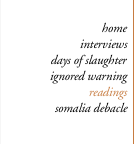 | 
 |


In November 1994, the United Nations established the International Criminal
Tribunal for Rwanda to prosecute Rwandan officials for the 1994 genocide of
Tutsis. Prosecutors of the tribunal can charge people for violations of the
1948 Genocide Convention along with internationally accepted crimes against
humanity, which for the first time includes rape. The tribunal is based in
Arusha, Tanzania and as of June 1999 has completed five cases.
The first judgment was on Sept. 2, 1998 when Jean-Paul Akayesu was found guilty
of nine counts of genocide and crimes against humanity. Akayesu is a former
mayor of Taba, a small town in central Rwanda. He was sentenced to three life
terms plus 80 years. He is appealing his sentence.
On Sept. 4, 1998, Jean Kambanda, former prime minister of Rwanda, pled guilty
and was sentenced to life imprisonment for six counts of genocide and crimes
against humanity. On December 14, 1998, Omar Serushago, a former Rwanda Hutu
militia leader pled guilty to four counts of genocide. He was sentenced to 15 years in prison.
On May 21, 1999 Clement Kayishema was sentenced to life in prison and Obed Ruzindana was sentenced
to 25 years.
29 other officials still await trial before the U.N. tribunal.
At another level, the Rwandan National Judicial System is prosecuting Rwandan
citizens alleged to have participated in the genocide. As of January 1999, at
least 864 people have been tried in the courts and 116 sentenced to death--22 of which were
publicly executed in April 1998.
However, over 100,000 suspects are crowding Rwanda's prisons waiting for trial
and, in October 1998, the Justice Ministry announced it will release 10,000 of
them because their files lack incriminating evidence.
Click here for details on the
United Nations International Criminal Tribunal for Rwanda including outlines of the procedures, summaries and full text of the judgments, and links to related sites.
In early spring 1999, The U.N. announced the establishment of a panel to investigate the U.N. role in the Rwanda genocide.
On May 7, Kofi Annan appointed former Swedish prime minister Ingvar Carlsson as head of the independent
inquiry. The panel has a timeframe of six months to complete the report.
 |  |  |